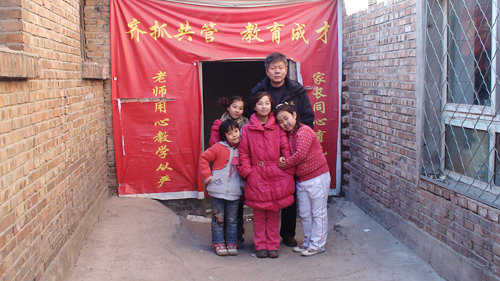|
 |
|
TOGETHER WITH YOU: Yan Zhaoshi and his students at the Yanjing Little Swan Primary School (WU PENG) |
Yan Zhaoshi never thought his life would change so dramatically at the age of 42.
A local Beijinger, Yan had been working as an engineer in downtown Beijing for almost 20 years with an annual income of more than 100,000 yuan ($15,620).
This changed suddenly in July 2010, when Yan decided to take over a primary school for migrant children in the suburbs.
A quick decision
"This decision was made almost in the blink of an eye," said Yan, who had previously been working in the private Yanjing Primary School for months as a volunteer teacher of mathematics and science on weekends.
One day in late July 2010, Yan went to the school and saw people moving supplies onto a truck. After half an hour, the headmaster left the school with the truck.
Yan had heard the school's headmaster complaining of the difficulties of running the school, but he had never taken it seriously.
"If the school were closed, the students in the school would have nowhere to go for education after the summer vacation," said Yan, who immediately decided to take over the school with his friend. "We didn't think that much. We just thought we should do this at that moment."
Yan quit his job in August 2010. "I knew in many ways it was almost impossible for this school to survive for a long time, but I still wanted to give it a try," he said.
The school with more than 200 students was originally located in Tangjialing, a village on the northwestern suburb of Beijing. In 2010, the whole area was demolished and Yan had to find a new place for his school.
Yan and his friend then spent almost one month looking for a new place and finally rented a furniture warehouse in nearby Liulitun Village. On August 25, 2010, the school moved to the new location.
Yan renamed the school Yanjing Little Swan Primary School, making reference to the titular character of The Ugly Duckling. He divided the warehouse into eight small classrooms and a small playground. One classroom even lacks a door and the roof is just a large steel plate.
Every morning, Yan delivers pep speeches. "I want to tell all the children in this school that everyone is gifted in some way. Don't feel bad and don't give up," Yan said.
Recruitment woes
Before Yan decided to work as a volunteer teacher in the Yanjing Primary School, he visited quite a few other schools for migrant children and felt astonished by the poor teaching quality in schools of this kind.
"Actually some operators don't lay importance on improving teaching quality, they sometimes even do the opposite. Though schools for migrant children are usually considered not profitable, they have their own ways to make money," Yan said.
The ways Yan referred to include setting teachers' salary as low as possible, embezzling students' food service payments and even opening Internet bars in the school.
The Yanjing Primary School was no better. Yan once asked his students to write down some scientists' names that they knew, but nobody could give even one.
After taking over the school, Yan's first actions were to recruit new teachers and give raises to some returning teachers. He changed seven out of 10 teachers in the school and raised salaries from 960 yuan ($150) to 2,000 yuan ($313).
"I believe only higher salaries can attract better teachers," Yan said. "We might not be able to afford to offer the students good schoolbags, but we must provide them with good teachers."
But even the doubled payment does not meet the teachers' basic needs of living in Beijing.
Zhang Xiaofang, a 28-year-old woman who had been teaching in the school for five years, quit in the autumn of 2011. Zhang's family found her a job in her hometown. Her boyfriend also doubted her prospects as a teacher in a private school for migrant children and enticed her with a marriage proposal.
"They were not happy with my job and said it was not stable. We argued for a long time," said Zhang, who was in tears when she finally left.
| 